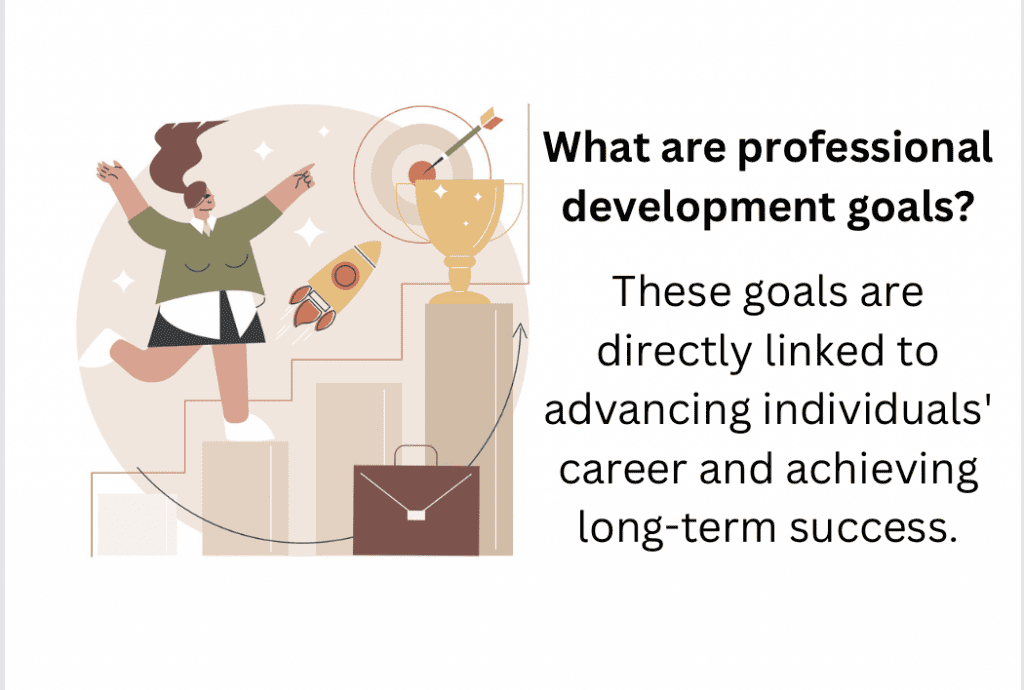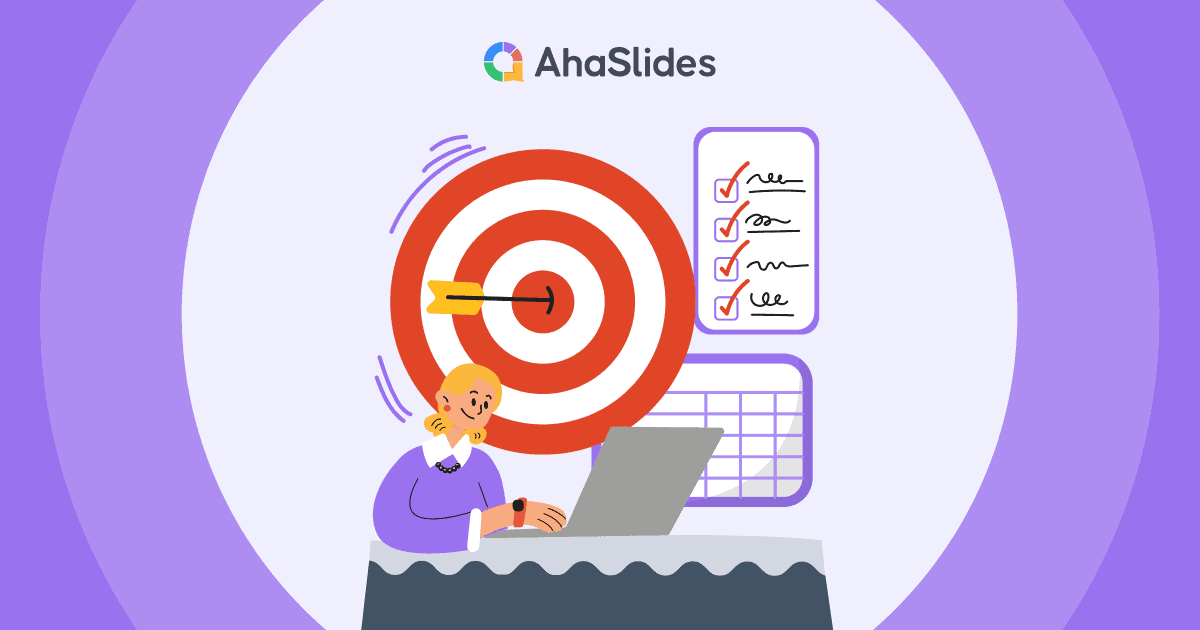Are you feeling stuck in your career? Do you want to take your skills to the next level? In order to maintain a successful and competitive career, it is imperative for individuals to set specific and measurable professional development goals.
Check out all insightful information about professional development goals, this concept, examples, and tips to make your goals measurable and achievable.

Table of Contents
- What Are Professional Development Goals?
- What Are Examples Of Professional Development Goals?
- How to Set Professional Development Goals
- Professional Development Goals vs Personal Goals For Work
- FAQs
- Key Takeaways
Tips for Better Engagement
What Are Professional Development Goals?
Professional development goals are objectives set by individuals to improve their skills and knowledge in their chosen fields. The concept of professional development is based on the idea that learning and development are ongoing processes that never stop.
These goals are designed to help individuals grow and develop in their careers, increase job satisfaction, and enhance performance.
It is crucial for individuals to establish professional development goals which aim to thrive in their profession and remain up-to-date in their industry.

What Are Examples Of Professional Development Goals?
Professional development goals should be tailored to your unique career desire and align with your long-term vision for success. There are various examples of professional development goals that individuals can set for themselves. Some of them are as follows:
- Enhance Leadership Skills: Attend leadership workshops, participate in team-building exercises, and take on leadership roles in projects to improve leadership abilities and communication with team members.
- Obtain Industry Certifications: Pursue relevant certifications or licenses to demonstrate expertise in a specific field, such as project management, digital marketing, or data analysis.
- Develop Project Management Abilities: Enroll in project management courses or seek opportunities to lead and manage projects to hone project management skills.
- Strengthen Negotiation Skills: Attend negotiation workshops or seek mentorship to become a more effective negotiator in a business context.
- Learn new technical skills: Set a goal to acquire new technical skills, such as programming languages, data analysis tools, or software applications relevant to your field. Enroll in online courses, attend workshops, or seek mentorship to stay up-to-date with emerging technologies and industry trends.
- Build your professional network: Networking plays a pivotal role in career advancement. Set objectives to expand your professional network by attending industry events, conferences, and networking functions.
- Apply for a promotion: If you aspire to take on greater responsibilities and advance your career within your current organization, set a goal to apply for a promotion. Specific goals might involve gaining experience and the required qualifications to meet this role.
- Conduct a competitor analysis: Conducting a competitor analysis is an effective way to gain insights into your industry's landscape and identify potential areas for improvement. Set a goal to research and analyze your competitors' strategies, products, and services to inform your own business decisions and stay ahead in the market.
⭐️ If you are looking for better ways to enhance your employee's skills, give them friendly feedback, and active involvement during virtual training, don't forget to add interactive quizzes, and real-time collaboration elements in your presentation or meeting. AhaSlides offers all related support to level up your next training and meetings.

Get your Organisation Engaged
Start meaningful discussions, get useful feedback and educate your team. Sign up to take free AhaSlides template
🚀 Grab Free Quiz☁️
How to Set Professional Development Goals

Setting professional development goals is a crucial step in advancing your career and achieving long-term success. To ensure that your goals are effective and actionable, consider the following steps:
Learn from the Past
Reflecting on your past experiences and setbacks can be a useful tool for gaining insights into your career path. There is no better way than learning from both successes and mistakes. Try identifying areas where you have excelled and where there is room for improvement. Understanding your strengths and weaknesses will help you set goals that align with your development needs.
Make Your Goals SMART
Utilizing the SMART model to structure your goals is the most common and effective way nowadays.
- Specific: Clearly define what you want to achieve. Avoid vague statements and focus on concrete outcomes. For example, instead of setting a goal to "improve communication skills," make it specific like "deliver two successful presentations to cross-functional teams by the end of the year."
- Measurable: Set criteria to measure your progress and success. Measurable goals allow you to track your achievements and stay motivated. For example, "attend at least three leadership workshops in the next six months" is a measurable goal.
- Achievable: Ensure that your goals are realistic and attainable. Consider the resources, time, and effort required to accomplish them. Setting overly ambitious goals may lead to frustration and discouragement.
- Relevant: Align your goals with your career aspirations and organizational objectives. Choose goals that will contribute to your professional growth and align with your long-term vision.
- Time-Bound: Set a clear deadline for achieving your goals. A specific time frame adds a sense of urgency and helps you prioritize your efforts.
Set Long-term Goals
Remember that professional development goals must align with your long-term career aspirations. Consider where you want to be in five or ten years and determine the skills and knowledge needed to achieve those objectives.
For instance, if your career goal is to become a marketing manager, your professional development goals might include honing your leadership and strategic planning abilities.
Monitor and Track Progress
Keeping an eye on your progress is an important step to setting up effective professional goals not just in the present but also for the years to come. The 2023 goals might not be the same as the 2022 goals, and even if you are on the way to accomplishing your goals, many issues might arise, and records are the only way to know whether it's time to make any adjustments.
- Keep a Journal or Digital Tracker: Maintain a journal or use a digital tracking tool to record your efforts and achievements. Document the actions you've taken, milestones reached, and any challenges encountered along the way.
- Measure Quantifiable Metrics: Identify quantifiable metrics relevant to your goals. For example, if your goal is to enhance leadership skills, track the number of leadership workshops attended, team projects led, or positive feedback received from colleagues.
- Use Data and Feedback: Utilize data and feedback to evaluate your progress objectively. Collect data through surveys, performance reviews, or self-assessments. Honest feedback from supervisors, peers, or mentors can provide valuable insights into areas for improvement
Related:
Professional Development Goals vs Personal Goals For Work
When it comes to setting goals for work, there's a difference between personal and professional goals.
Unlike personal goals for work, which may strongly focus on work-life balance, fostering emotional intelligence to handle workplace challenges effectively, or general self-improvement, professional development goals are directly linked to advancing individuals' careers and achieving long-term success.
Professional development goals are specifically designed to enhance skills, competencies, and overall effectiveness in one's profession, which aims at staying relevant in a rapidly evolving job market.
FAQs
What is the meaning of professional development goals?
By setting and pursuing professional development goals, individuals can improve their performance, increase their value to their organization, and achieve greater job satisfaction.
What are the 5 P's of professional development?
In terms of career management, the Five P's correspond to Possibility (opportunities that push the boundaries of your career), Presence (personal brand and professional image), People (professional network), Perspective (holistic approach to career growth in the long-term), and Perseverance (determination to overcome challenges).
What are good professional development goals?
Good professional development goals are those that are specific, measurable, attainable, relevant, and time-bound. Some examples can be listed such as learning a new programming language, obtaining a certification, gaining leadership skills, or expanding professional networks.
Key Takeaways
Someone used to say that: "In the absence of clear goals, we wander; but with purposeful goals, we chart the course of our success". Professional development goals are the utmost step that provides us with a roadmap and a sense of purpose, propelling us forward on our career journey of growth and achievement. So, what are you waiting for? Start setting your professional development goals today!
Want more inspiration? Check out AhaSlides right away to help you achieve your professional development goals! With advanced tools, you can increase your work performance and leverage teamwork.
Ref: Coursera | Attendancebot








